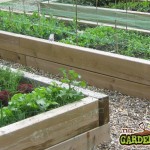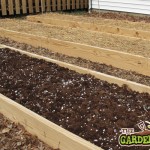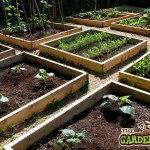There are many ways in which to grow vegetable and herbs. Whether you have a large garden or just a small yard in which to work, there is always a way for you to grow your own juicy fruit, tasty vegetables and yummy herbs. Raised beds are a great way to optimise your garden and minimise the amount of work you need to do.
- raised bed with netting
- Raised beds with different soils
- raised bed layout
Timber Raised Beds can come in all shapes and sizes, they can be build from a range of materials from timber sections, railway sleepers, bricks, blocks, galvanised sheeting amongst others. It is not so much what they are made from but what use you put it to.
One of the main benefits of raised beds is how much easier they are to maintain then traditional vegetable plots. Weeding, sowing, maintaining crops and harvesting can all be done without excessive leaning and bending over. With many hours spent weeding my vegetable beds and herbaceous border I can quickly see the benefits of raised beds.
Soil preparation itself can be done without the need for extensive digging and ground preparation. Generally, when digging over a vegetable plot, the soil needs to be dug to a depth of 1 ½ foot. With raised beds the soil would already be quite light and would therefore require less preparation. If you are using a raised bed for the first time there the soil preparation is very simple. All you need to do is mix your regular garden soil with general potting compost. The quality of your garden soil will determine how much compost you will need to add.
Another benefit of using raised beds is that you can modify the soil type to suit whatever vegetables you want to grow. Most vegetables prefer slightly acidic soils, while potatoes and some fruit prefer acidic soil. Root crops such as carrots, parsnip & beets prefer lighter and deeper soil so they can develop long deep roots. Brassicas such as cabbage and broccoli like soils high in fertility. You can easily modify the soil in raised beds to whatever condition you require. Add garden lime to reduce acidity, add ammonium sulphate to make soil more acidic, add farm yard manure to make soil lighter while removing all stones and rocks from soil.
Raised beds also offer additional protection against garden pests. The carrot fly for example is a common pest that attacks carrots. These pests merely hop and don’t fly, therefore you can control against them by raising the height of your carrots. Having beds that are 2ft high is sufficient to control against this pest.
You can also reduce attacks from slugs and snails by attaching copper slug tape or lining the edge of your raised beds with egg shell. Both these options act as a barrier to slugs and will reduce damage to your brassica crops.
Raised beds also allow you to order and organise your vegetable garden. Ideally you should have 4 to 6 vegetable beds. That way you can specify one rotation crop to each bed and rotate them each year.
Raised beds are very versatile, as they can grow a wide range of crops and hold a different soil types and they can be used in small or large gardens. Certain crops such as rosemary and other herbs prefer raised beds as the soil is better draining and therefore dryer


